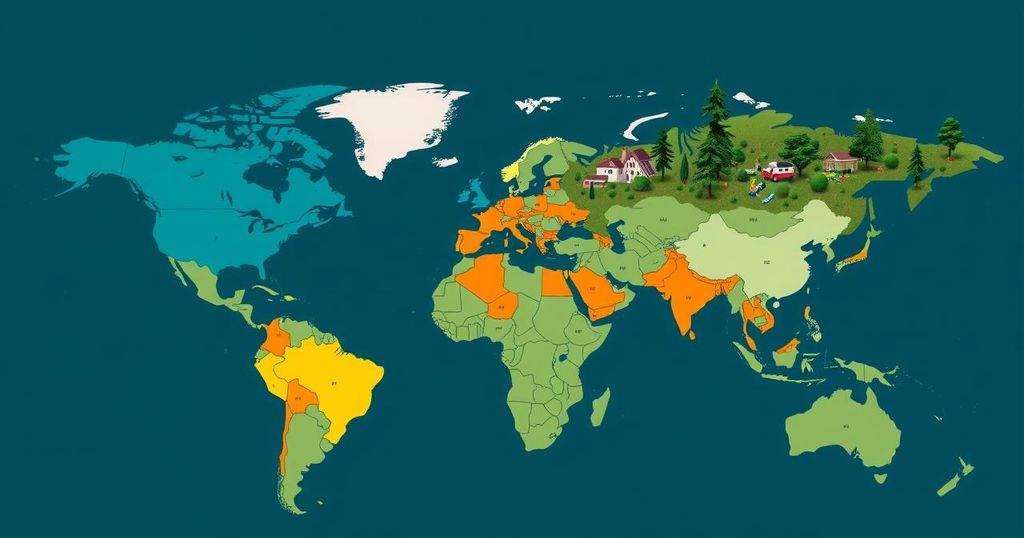Richer nations are beginning to compensate poorer countries for climate change damage. Cyclone Freddy in Malawi exemplified the urgent need for such funding, as communities grapple with the aftermath of extreme weather. Initiatives are underway, including Scotland’s cash aid, but experts warn that current pledges may not suffice as climate-related disasters escalate. A comprehensive funding strategy is crucial to support affected populations.
In the wake of Cyclone Freddy, which devastated southern Malawi in 2023, many families have faced dire consequences, including the destruction of homes and loss of livestock. Christopher Bingala, a subsistence farmer, was among those affected but, through a new climate change compensation program, received approximately $750 to rebuild his home. This funding represents an evolving landscape where wealthier nations acknowledge their ecological debt towards developing countries severely impacted by climate disasters, even though the total funded amount remains insufficient considering the rising frequency of climate-related events.
The concept of “loss and damage” compensation emerged from discussions led by wealthy nations, agreeing to provide financial assistance to poorer countries most affected by climate change, despite having contributed minimally to global pollution. Thus far, commitments amounting to around $720 million have been pledged, with the international community currently negotiating the specifics of these payments at the COP29 summit in Baku, Azerbaijan. Experts warn, however, that the devastation wrought by worsening climate phenomena may outstrip the funds allocated to address these calamities.
Cyclone Freddy’s impact was profound, with 650,000 people displaced in Malawi alone after months of rain inundated the region in just six days. Once displaced, Bingala and his family faced severe shortages, resorting to consuming deceased animals due to a lack of food. Their situation transformed when they received governmental aid from Scotland, facilitating their relocation and the construction of a new home in a less prone area. Despite ongoing challenges, such as education for his children and livestock recovery, Bingala expressed relief that his family is safer, proving that targeted aid can make a significant impact on lives devastated by climate catastrophes.
Additionally, the financial support provided by Scotland’s pioneering initiative, a vital pilot for a more extensive climate compensation framework, underscores recognition of the vulnerabilities faced by low-income households in developing nations like Malawi, where access to insurance is almost nonexistent. Experts emphasize the urgent need for substantial financial support, as events like hurricanes can lead to crippling national debts that affect public recovery and rebuilding initiatives.
As developing nations increasingly contend with escalating climate-related disasters, anticipated funding requirements are projected to reach $250 billion annually by 2030. Prime Minister Philip Davis from the Bahamas highlighted the pressures of national debt exacerbated by climate impacts, arguing that unresolved humanitarian crises can create wider ramifications beyond borders. He stated, “If they do nothing, they will be the worst for it. When my islands are swallowed up by the sea, then what do my people do? They’ll either become climate refugees or they’ll be doomed to a watery grave.”
Given the many dimensions of climate impacts, including relocation needs and the preservation of cultural resources, stakeholders must work together to design a more comprehensive and effective loss and damage funding strategy to support those vulnerable to the effects of climate change.
The intersection of climate change and socioeconomic disparity is increasingly pressing, with poorer nations disproportionately bearing the brunt of climate-related disasters despite having contributed minimally to the causative factors. The introduction of funding mechanisms aimed at compensating developing countries for loss and damage sustains the discourse on climate justice and accountability. As extreme weather events become more frequent, establishing reliable funding and actionable strategies will be essential to aid affected populations and support reconstruction efforts.
In conclusion, the implementation of loss and damage compensation funding marks a critical advancement in addressing the repercussions of climate change on vulnerable populations in developing nations. As wealthier countries take on financial responsibilities, it is imperative that these commitments translate into effective assistance. With projected funding needs escalating substantially, comprehensive strategies and international cooperation will be needed to support individuals and communities facing the harsh realities of climate challenges.
Original Source: www.wosu.org






